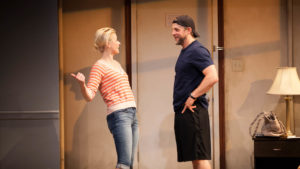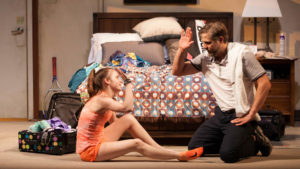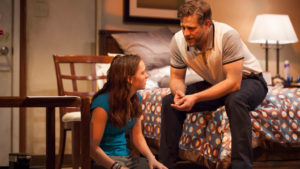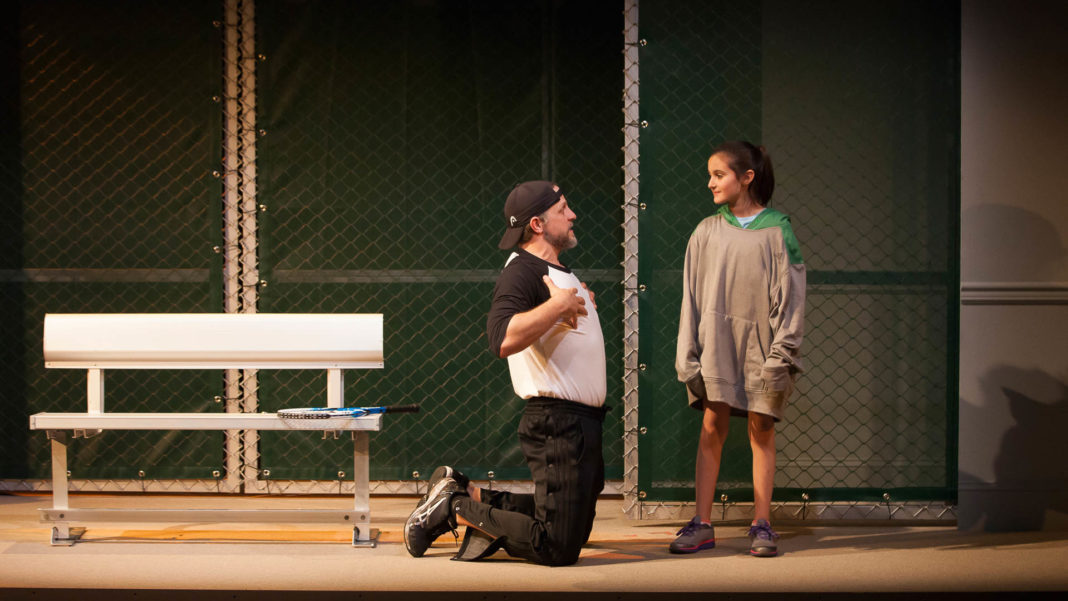Actor Joe Tippett doesn’t really think anyone knows who he is. He’s repeatedly claimed anonymity or at least relative anonymity. If you look him up on the internet you’ll find more about his relationship (with Sara Bareilles) than you will about him. Which is too bad. Tippett is an outstanding actor as anyone who saw the short-lived television series Rise can attest to. But if you’re in Los Angeles, you’ll have a chance to see him on stage in the play Our Very Own Carlin McCullough at the Geffen Playhouse through July 29th.

The play was written by actress Amanda Peet and depicts the struggle over the best path for a young female tennis player to take. One on side is her mother, Cyn (Mamie Gummer) and on the other side is her coach, Jay (Tippett.) There is definitely some unacknowledged chemistry between mother and coach. There’s also a young girl in search of a father figure since her parent’s divorce. Jay seems to be the first choice of young Carlin (played at age 10 by Abigail Dylan Harrison and at age 17 by Caroline Heffernan)
I recently spoke with Tippett about the play, what is and isn’t defined about his character and other roles that share some similarities with Our Very Own Carlin McCullough.
One of the fascinating things about Jay is that we don’t know all the much about his life before the play. Did you create a backstory for him?
There was talk about that kind of stuff. Amanda Peet was very sort of allergic to any sort of explicit dialogue. There was a back and forth about some of that. In a film you can cut to somebody and know their subtext is “I love you.” In theatre that gets hard. Shakespeare said you have to be explicit. Amanda was convinced that all the stuff is kind of there. I think towards the end Cyn talks about how he lost 20 matches in a row once he went pro. He couldn’t quite hack it.
Has he been successful in love?

I don’t think he’s had many steady relationships. I don’t think he’s ever gotten too close to anybody. That’s what special about the Carlin and his relationship. He’s met this young girl where he sees an opportunity to be vindicated. He’s rejecting his shortcomings and making up for it through Carlin. He’s in love, not in a sexual way, but they are kindred spirits. It’s strange. You’re talking about somebody in this arrested development and emotionally is a young man at heart even though he’s in his mid-30s. He has no nefarious motives about sexual behavior, but he is trying to exercise demons of his own as far as his professional career is concerned.
What was it about this role that felt most challenging to you?
It’s a deceptive play. It’s a quiet little play that requires a tremendous amount of emotional investment. When people are choosing to purposely not talk about the things they want to talk about, that dramatically comes to life. Not allowing the trap of language that isn’t explicit to cut across the emotional value.
The characters do find themselves in awkward situations because they don’t talk about things. Since we’re talking about an older man and a young girl do people look at Jay more sympathetically because the play was written by a woman?
I remember a lot of us were a little sensitive to some of this stuff. Amanda said up front “I don’t think this conversation is black and white.” I tend to think she’s right. We’re at a moment when the pendulum swings so swiftly from one side to the other and in real life most stuff is in the gray.

In All the Fine Boys you were playing a 28-year-old in a relationship with a 14-year-old girl. Here you are playing coach who has a teenager in love with him. Is there something going on where playwrights want to explore these kind of relationships and why do you think that is happening now?
I also did Indian Summer where I’m a 28 year old guy with a 16 or 17 year old. I don’t know what it is about me. I’m not sure what the moment is. I think each one of these playwrights had an experience the inspired that. I know Amanda had a relationship with a camp counselor she thinks was pretty innocuous but it was frowned upon. To circle back post Larry Nassar, what is acceptable and isn’t is now under discussion. I was talking to my dad about this. Some of this stuff feels like it is overkill and some of it is we haven’t been paying attention to the right people. I don’t know where it ends up in the corner of acceptability; this conversation of politic correctness. I don’t know how you tell them not to be politically correct and still be themselves. I think things are changing faster than people can change.
Every actor takes risks to succeed. Tennis legend Arthur Ashe once said “You’ve got to get to the stage in life where going for it is more important than winning or losing.” Do you agree with him and are you at that point?
I think that’s true. Am I there? I don’t know. I’m happy. But it’s hard to say what is going by. When you are acting you are just like a hired gun – unless you are writing your own stuff. It ends up being how long you stick it out. It’s like if you stick around in a bar long enough somebody will take you home. I haven’t hit the jackpot, but I make enough money at the table to keep playing cards. I think the sentiment is absolutely correct. It just requires patience and whatever that version of “going for it” is. You can get kicked in the nuts every day for five years and then this is for you. I’m enjoying what I’m doing. I’ve had the opportunity to do brand new work, particularly a lot by new female playwrights coming up. That to me has been worth sticking around for.
Main Photo by Chris Whitaker










